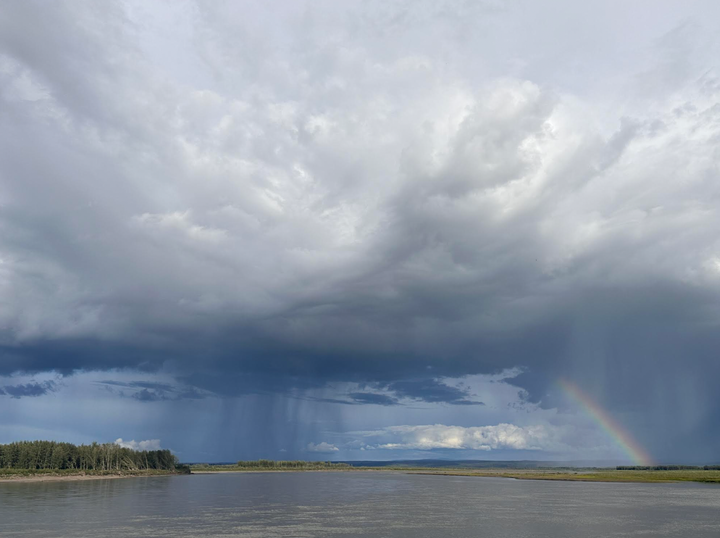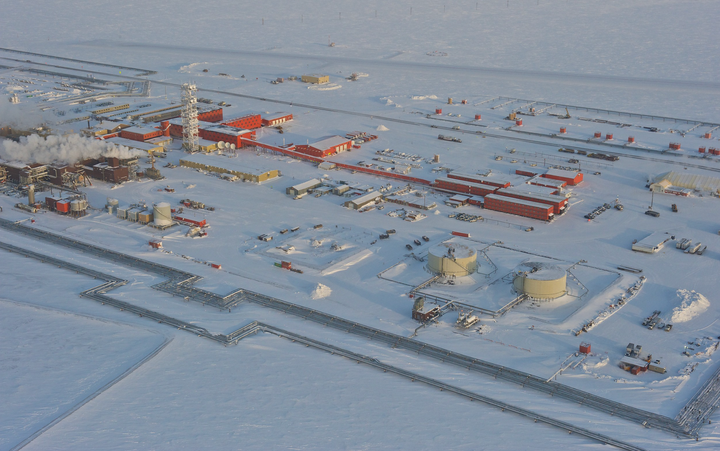In Norway, a fossil fuel feud at a celebration of the national sport
A standoff between World Championships organizers and Norwegian climate advocates is threatening to mar an otherwise impeccably executed event.
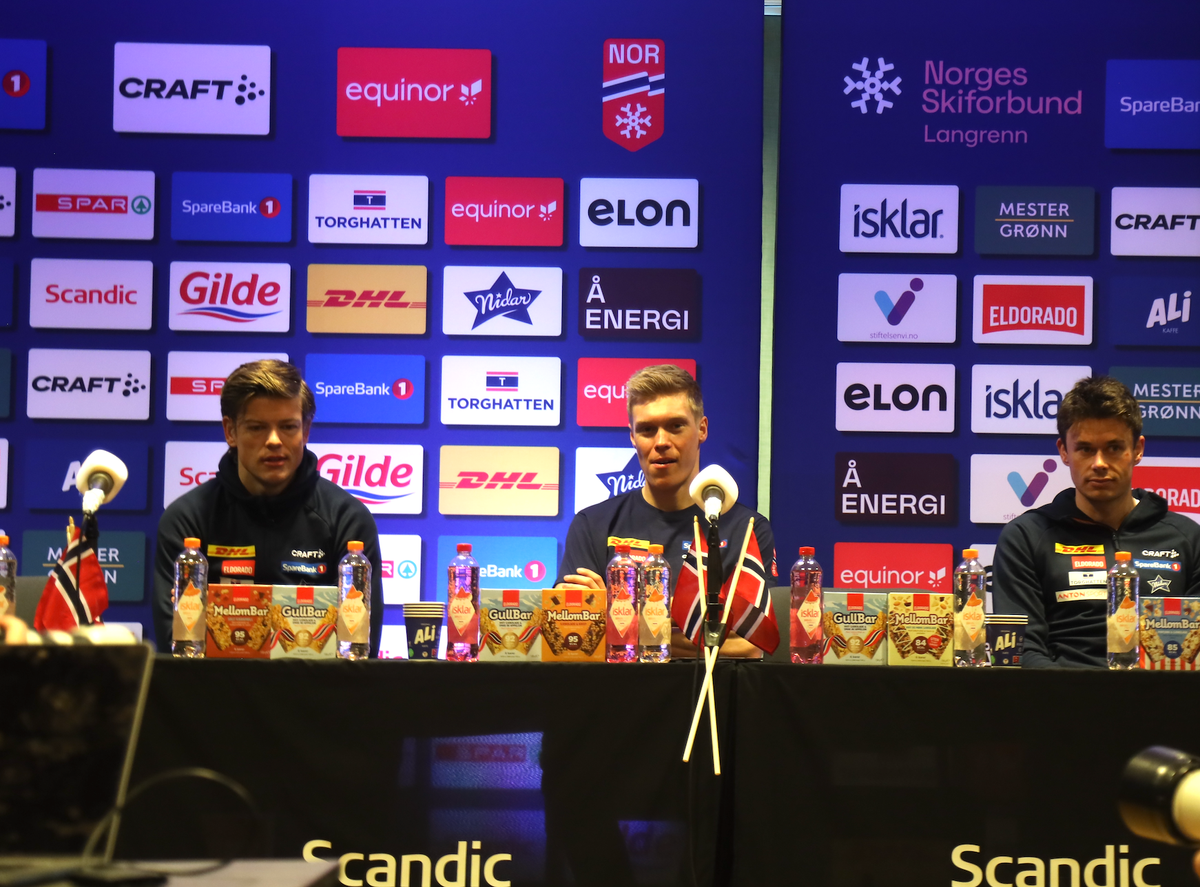
Greetings from Norway, where I've been reporting on the 2025 cross-country skiing World Championships. I'm here working with a skiing website, FasterSkier, and we cover the races themselves — but the most interesting stories, for me, are always off the trails. Here's a dispatch that I think would be of interest to Northern Journal readers, on a standoff over fossil fuel advertising at the event.
If you're looking for something more lighthearted, you can read this story in which I drink flaming moonshine on the side of the race trails...or you can just watch the video. More soon.
TRONDHEIM, NORWAY — The World Championships for cross-country skiing have so far gone off impeccably in this coastal city of 200,000.
Epic duels between the top Norwegians and Swedes. Huge crowds lining the trails and packing into a city square for medals ceremonies. Steady bus service from downtown to the racing venue, where fans can buy locally produced foods.
But one thorny problem remains unsolved, and threatens to mar what’s otherwise been an impeccably produced event: a standoff between organizers, competitors and a group of Norwegian climate advocates.
The advocates are planning what they describe as a peaceful disruption of the marquee race of the championships, the men’s 50-kilometer marathon Saturday.
Folk Mot Fossilmakta, or People Against Fossil Power, says it offered to stand down if the race organizers agreed to two requests: playing a short video for fans about a fossil fuel non-proliferation initiative, and removing the logo of event sponsor Equinor, Norway’s state-owned oil company, from visible advertising.
Organizers refused, writing in a letter that they had a responsibility to “facilitate the fulfillment of dreams and experiences” in Trondheim, “without fear.”
In response, leaders of the demonstration plan to occupy a spot on an uphill early in Saturday’s race. The day before, they will share the exact time and location with the police, who say they will “immediately stop any protests” on the course but also must balance public order with Norway’s “fundamental right to freedom of expression.”
The biggest remaining question mark is the crowd of boisterous fans that has gathered to watch the races at Trondheim’s Granåsen venue, many of whom have been drinking heavily. In the past, critics on social media have threatened physical violence against climate activists who disrupted other races.

“I understand completely that it’s super provoking, this kind of action. But we want to also help people direct their feelings and anger and frustration where it belongs — because it is the fossil fuel industry that is ruining things for all of us,” said Ragnhild Kvist Simonsen, a Folk Mot Fossilmakta spokesperson. “They’re willingly and knowingly killing the sport. And the fact that we have plans to disrupt one race this week is nothing compared to the disruption and death of the sport that the fossil fuel industry actually inflicts on these people.”
Equinor, which until 2018 was named Statoil, says that 20% of its capital investments are now going toward renewables and low-carbon solutions, and it aims to reach net zero emissions by 2050.
But more than 99.5% of the energy it produces still comes from oil and gas, according to its most recent annual reporting. Last month, it announced it would slash its planned investment in renewables and boost oil production by 10% over the next several years.
Åge Skinstad, the lead organizer of the World Championships, called Equinor a “very, very serious company,” and said that “they have to answer about how they work.”
“We trust them in that work,” Skinstad said in an interview, adding that the company, for years, has supported Norwegian youth and junior skiers.
An Equinor spokesperson, Rikke Høistad Sjøberg, said the company shares “the impatience in the energy transition, and it is going slower than expected.”
“However, we continue to drive investments in renewable energy and low-carbon solutions like transport and safe storage of carbon dioxide,” she wrote in an email. “For us, it is important to balance the production of the energy needed today, while investing and developing the energy production and low-carbon solutions needed in the future.”
Athletes at the championships, meanwhile, are caught between the climate advocates and the companies that sponsor competitions and some of their teams.
Multiple Norwegian competitors, whose national ski association has long been sponsored by Equinor, have condemned the planned action.
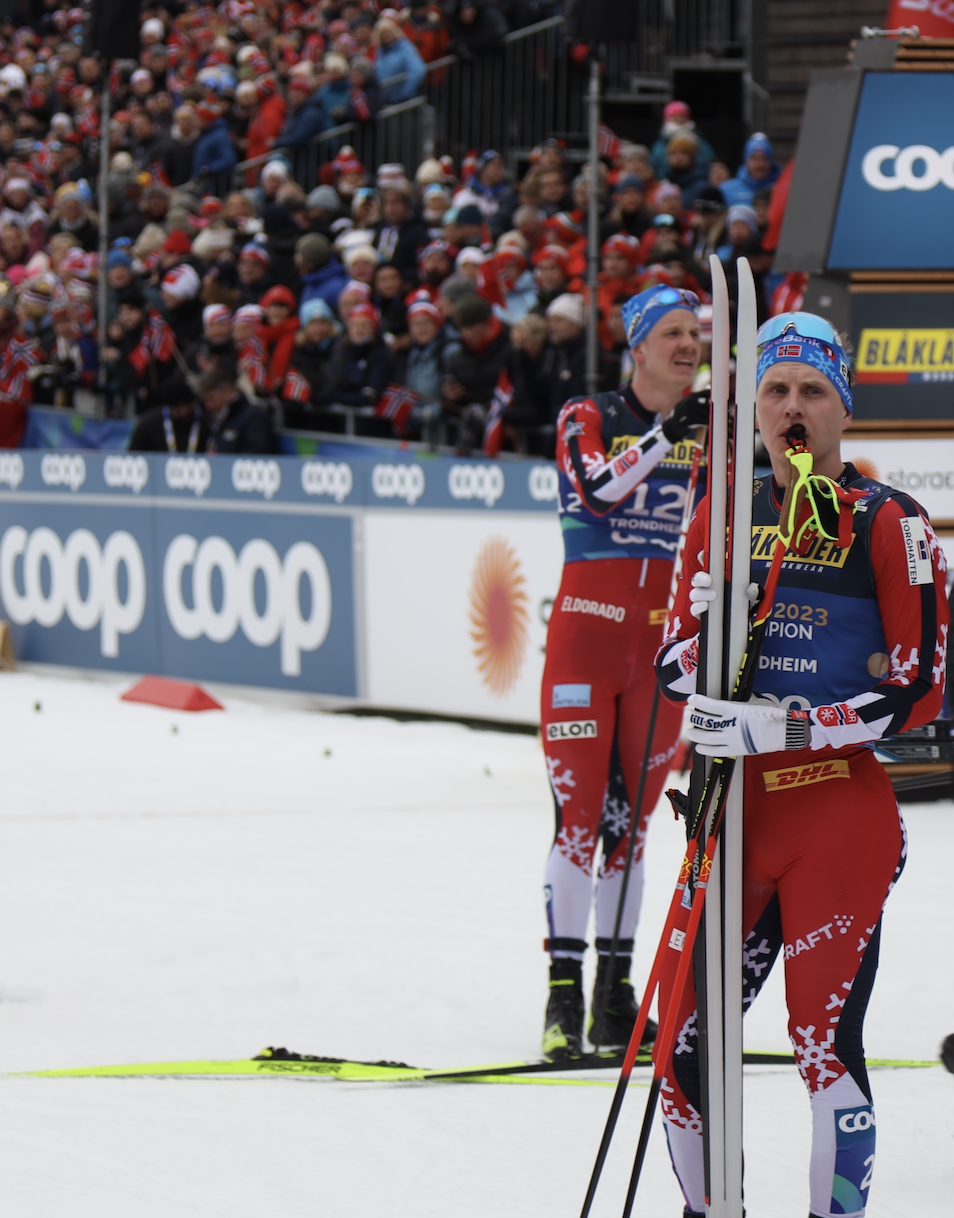
Simen Hegstad Krüger, an Olympic gold medalist, last month called the climate advocates “idiots” and warned about the potential for things to get “ugly.” At a news conference Monday, Norway’s Martin Løwstrøm Nyenget did not directly answer a question about the merits of Folk Mot Fossilmakta’s requests to the championships organizers, saying that “we see their message, but we don’t think it’s the right way, to interrupt a race.”
Nyenget declined to say whether he thinks it’s appropriate for a fossil fuel company to sponsor a cross-country skiing World Championships. “I’m not the one deciding this,” he said.
But in the past few days, other competitors have begun a dialogue with Folk Mot Fossilmakta.
They include two members of the U.S. Ski Team, which arrived in Trondheim in new racing uniforms depicting melting glaciers — a message aimed at drawing attention to climate change’s effect on their sport.
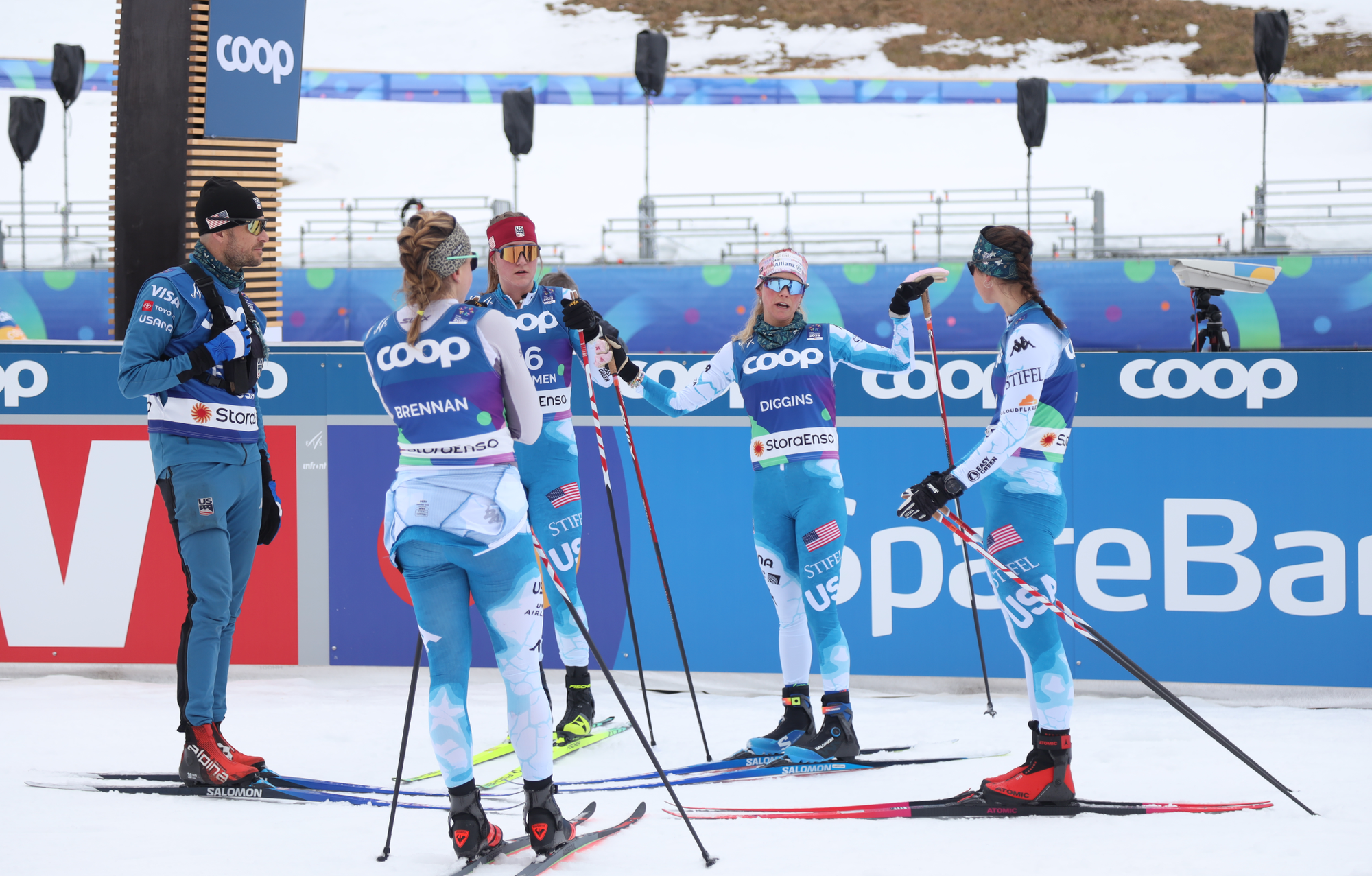
American Gus Schumacher, who already works with a winter sports-focused climate group called Protect Our Winters, met Monday with Folk Mot Fossilmakta along with the cross-country ski circuit’s two athlete representatives, American Julia Kern and the United Kingdom’s James Clugnet.
Schumacher called the meeting productive and said that leaders of Folk Mot Fossilmakta were “super reasonable.”
He said he hopes the group can be convinced to change its planned action in a way that allows them to draw attention to their position without affecting the 50-kilometer event.
“The biggest goal for us, in that meeting, was to convince them that obstructing the race wasn’t going to help them advance the message,” Schumacher said in an interview Monday. “Because it would stop athletes from wanting to speak out in support of them.”
Schumacher said that he, Kern and Clugnet hope to work with like-minded athletes in the next few days to draft their own statement about the urgency of climate action — much like one issued by a group of Swedish athletes last week in advance of a high-profile race there, the Vasaloppet.
“We’re doing our best to get athletes who share the protestors’ general values on board while parsing out the exact details,” Schumacher said. “The most important thing is to show some solidarity.”
Folk Mot Fossilmakta is part of the A22 Network, an international coalition of civil disobedience campaigns focused on the environment. The group’s efforts also include pushing Norway’s $1.7 trillion state oil-wealth fund to divest from fossil fuels.
Its spokespersons include Simonsen, 26, who works at a Trondheim cafe when she’s not organizing, and Callum Macintyre, a 32-year-old Scot who moved to Norway to get a masters degree in climate change policy.

Their efforts around the World Championships were, Simonsen said, an experiment in “open organizing.”
In the past, some members of the group have been involved in unannounced climate actions at high-level ski races. But weeks before this year’s championships started, Folk Mot Fossilmakta went public about its demands of the organizers.
“What we really want, from our actions, is to create a conversation about these things that Norway, as a society, struggles to talk honestly about,” Simonsen said. “We are a petrostate, an oil nation that produces and exports huge amounts of oil and gas. And the fossil fuel industry, in our country, is hugely influential on our culture. To be a Norwegian is to have an identity around oil.”
Simonsen’s group points to recent comments on a podcast by Clugnet, the British athlete, who noted his positive attitude toward Equinor because of the company’s past sponsorship of cross-country ski races.
Folk Mot Fossilmakta’s open organizing strategy, its leaders say, has been a tremendous success: In the days leading up to the championships, the group’s requests and plans have received intense media coverage and attention from athletes and teams.
At a community gathering Sunday, the group drew some 30 people to a downtown Trondheim meeting space.
Between bites of carrots and hummus, participants learned about the Fossil Fuel Non-Proliferation Treaty Initiative, which is led by Pacific Island nations and targets the production and development of oil and gas, rather than just consumption.

They also held small-group discussions where they contemplated the weaknesses of their organizing strategy and arguments.
“This is definitely the question: How far can protests go?” asked one participant, Anne Klenge, 26. But, she added: “It’s not blackmail. It’s the public interest we’re doing this for.”
Another participant, a postdoctoral researcher who would only give his first name, Andreas, criticized what he described as shallow and “aggressive” Scandinavian media coverage of the planned demonstration.
“Who are the activists here, really?” he asked. “The skiers that carry the logo are activists, in the sense that they are promoting fossil fuel extraction.”
Andreas, 46, said he plans to participate in Saturday’s action, though he said the lead-up has been psychologically challenging, “because it’s so unpopular.”
“I’m a little worried that spectators will interfere,” he said.

Folk Mot Fossilmakta’s leaders say the Norwegian police have been clear that they will protect demonstrators’ safety, in addition to ensuring the safety of athletes.
In a lengthy response to emailed questions, a police lawyer, Ole Andreas Aftret, said his agency would “take necessary action to uphold public order and prevent bodily harm.” At the same time, he added, Norway is a liberal democracy where freedom of expression is a “fundamental prerequisite,” and political activists have “greater leeway in public spaces than anyone else.”
While the police will “immediately stop any protests in the race course,” Aftret said, they would have to consider the specifics of a situation before any attempt to restrain advocates in advance of a planned demonstration.
“Taking action against activists before they’ve done anything that causes a risk of violence or disruption to public order, or before they’ve demonstrated a clear intent to do so, raises questions about censorship and political bias,” Aftret said. “This does not, however, mean that the police are powerless and must stand by while someone blocks the course and causes a major disruption.”
Skinstad, the championships’ lead organizer, said event officials had a good discussion with Folk Mot Fossilmakta and that “free speech is no problem for us.”
But, he added, he hopes the group understands that it would be wrong “to ruin a competition for athletes that have been training maybe 10,000 hours to reach their main goal, maybe, in their life.”

“They can do the messages in the way they want outside the field of play,” Skinstad said. “But inside the field of play, I really hope that they understand they have nothing to do.”
Macintyre, the Folk Mot Fossilmakta spokesman, said that his group’s ongoing discussions with Schumacher, Kern and Clugnet could lead to an agreement that could change Saturday’s action.
“We see that the skiers’ voice is much more important than a disruptive protest,” he said.
But any pact would have to be serious, Macintyre said, not just symbolic — such as a commitment to work with the International Ski Federation, the organization that oversees all world championships, to endorse the fossil fuel non-proliferation initiative and ban fossil fuel sponsorship.
“We’re engaging with them,” Macintyre said. “But nothing is decided yet.”
If you like what you read, you can make a one-time contribution or become a voluntary paid member of Northern Journal, if you haven't already — and many thanks if you have.


